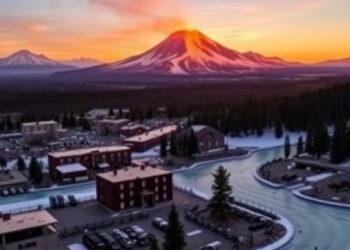In a rapidly warming world, the frozen expanses of our planet’s polar regions are undergoing profound transformations, with implications that extend far beyond their icy boundaries. This Special Issue of Science spotlights critical insights into the Arctic and Antarctic, focusing on how climate change is not only reshaping these landscapes but also presenting formidable geopolitical challenges for ongoing research efforts. The findings woven through the three pivotal Reviews and the Policy Forum present a compelling narrative about our planet’s future and the delicate interplay of climate science and international relations.
The Arctic, often considered the bellwether of climate change, is undergoing an alarming metamorphosis. Julienne Stroeve and her team contribute a Review that offers a harrowing glimpse into the potential state of the Arctic if current climate trends persist. Without an escalation in climate action, global temperatures are projected to soar a staggering 2.7°C above preindustrial levels. Under such conditions, the Arctic will face irreversible changes. The authors illuminate predictions indicating that nearly every day will witness temperature extremes previously unrecorded, painting a grim picture of an ice-free Arctic Ocean during the summer months. Greenland’s melt zones could expand by fourfold, while permafrost—critical for both ecosystems and human infrastructure—might diminish by as much as 50%. Such drastic alterations signal devastating repercussions for the local ecosystems, indigenous populations, and the infrastructure that underpins Arctic communities. However, Stroeve and her colleagues emphasize that significant climate action could alleviate some of these impacts, thereby preserving the ecological balance and stability that characterize these vital northern regions.
Helen Fricker’s Review shifts the focus southward to the Antarctic, a region essential for regulating not just Earth’s climate but also global sea levels and oceanic thermohaline circulation. Fricker and her collaborators reveal unsettling knowledge gaps that shroud our understanding of Antarctic processes. The intricacies involved in the stability of the Antarctic ice sheet are laden with uncertainties, which, in turn, cast doubts on the potential fallout from the ice’s ongoing disintegration. The Review underscores the urgent need for high-resolution satellite monitoring combined with on-the-ground field studies that can enhance our predictive models. Enhanced interdisciplinary cooperation is identified as a crucial prerequisite for reducing these uncertainties and refining our projections regarding the Antarctic’s future trajectory.
The biodiversity encapsulated within the Antarctic remains an enigma, a focal point in a third Review by Luis Pertierra and his team. Antarctica is home to a plethora of unique species, yet much about the subsurface life forms—ranging from invertebrates to microbes—remains shrouded in mystery. Pertierra et al. draw attention to the stark shortfalls in our understanding of the ecological fabric that sustains the continent. These deficiencies not only obscure our ecological insight but also hinder conservation efforts in one of Earth’s last great wildernesses. The authors advance a thoughtful framework for optimizing biodiversity research, aimed squarely at closing these gaps and illuminating the ecological dynamics that govern this remote region.
Amid the scientific unraveling of the polar mysteries, geopolitical tensions are brewing. Jennifer Spence and her colleagues address these pressing issues in the final Policy Forum, framing the Arctic as a forefront of global climate challenges, particularly within the context of international relations. As the impacts of climate change ripple across the Arctic, nations must grapple with the dual imperatives of economic development and environmental stewardship. The complexity inherent in governance across overlapping jurisdictions amplifies the challenge. Shifting political winds, including rising populism and mounting geopolitical distrust, further complicate efforts toward collaborative research and sustainable development.
Three predominant issues take center stage in Spence et al.’s discourse: First, understanding the nuanced regional and global consequences of climate change is paramount. Second, ensuring that research endeavors yield tangible benefits for Arctic communities is essential. Finally, sustaining international cooperation amid escalating geopolitical pressures is vital for progressive action. The current scenario demands innovative governance models, resembling those already emerging within the Arctic, which prioritize Indigenous engagement and cross-border collaboration facilitated by entities like the Arctic Council. This cooperation serves as a beacon of hope for sustainable development and collective environmental protection.
In conclusion, the evidence presented in this Special Issue is a clarion call to action for policymakers, researchers, and the global community. The state of Earth’s frozen regions is intricately linked to broader environmental and societal challenges that demand immediate attention and collaborative solutions. The findings within these Reviews and the Policy Forum underscore that understanding and mitigating the impacts of climate change requires an unwavering commitment to interdisciplinary research, robust dialogue among nations, and the mobilization of innovative governance frameworks that respect ecological integrity while advancing human well-being. As we stand at this critical juncture in history, the Arctic and Antarctic are not just distant realms; they symbolize the interconnected fate of our planet and all who inhabit it.
Subject of Research: Climate Change and its Impact on Polar Regions
Article Title: Extreme Conditions
News Publication Date: 7-Feb-2025
Web References: 10.1126/science.adw2518
References: Not Applicable
Image Credits: Not Applicable
Keywords: Climate Change, Arctic, Antarctic, Polar Regions, Biodiversity, Geopolitics, Environmental Protection, Scientific Research, Indigenous Engagement, Global Warming, Ice Melting, Ecological Integrity.




